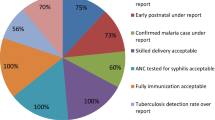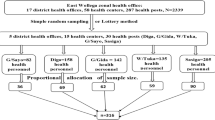Abstract
Background
Although quality information is key to reliable healthcare, health management information system (HMIS) data in low-income countries are inaccurate and not reliable. So, health managers should monitor quality of data and factors affecting it for system improvements. Hence, this study explored factors affecting HMIS data quality in southern Ethiopia.
Methods
This qualitative study was conducted in southern Ethiopia and included 15 key informants working at different levels of health system. Tools were developed following Performance of Routine Information System Management (PRISM) conceptual framework, which includes behavioral, technical and organizational factors. Data were analyzed manually using descriptive approach and framework analysis.
Results
The complexity of reporting forms and registers, inflexibility and low coverage of electronic health management information system (eHMIS) and frequent failure of computer system were some of technical challenges reported. Knowledge gaps of indicators definition, data handling, data analysis and interpretation and maintaining computer system were noted as major challenges at all levels. Negligence, low commitment and political influences were also noted in some cases. Moreover, inappropriate personnel assignment to the positions responsible for HMIS is causing difficulties in data management and use. Organizational and managerial supports to solve the challenges were reported insignificant.
Conclusion
Strengthening technical supports like training and mentorship is crucial to familiarize HMIS personnel with the system and address technical gaps. Negligence and low commitment needing administrative responses should be handled accordingly. Insufficient organizational efforts to maintain HMIS data quality and use show the need to advocate HMIS to decision-makers. Finally, in-depth investigation of reasons behind low commitment and political influence is needed to better understand root causes and links.
Similar content being viewed by others
Data availability
All relevant data are within the manuscript. No additional data is available for public.
References
World Health Organization. Developing health management information systems: a practical guide for developing countries. World Health Organization; 2004.
Krishnan A, Nongkynrih B, Yadav K, Singh S, Gupta V. Evaluation of computerized health management information system for primary health care in rural India. BMC Health Serv Res. 2010;10:310.
World Health Organization. Monitoring the building blocks of health systems: a handbook of indicators and their measurement strategies. World Health Organization; 2010.
World Health Organization. Toolkit on monitoring health systems strengthening health information systems. World Health Organization; 2008.
WHO. Improving data quality: a guide for developing countries. WHO; 2003.
Assessment of health. Facility data quality: Data quality report of Cambodia. WHO; 2012.
Health Information and Quality Authority. Guidance on developing Key Performance Indicators and Minimum Data Sets to MonitorHealthcare Quality Health Information and Quality Authority; 2013.
Guide to the. Health facility data quality report card. World Health Organization; 2013.
Mutale W, Chintu N, Amoroso C, Awoonor-Williams K, Phillips J, Baynes C, et al. Improving health information systems for decision making across five sub-saharan african countries: implementation strategies from the African Health Initiative. BMC Health Serv Res. 2013;13(Suppl 2):9.
Aqil A, Hozumi D, Lippeveld T. Tools for data demand and use in the Health Sector: performance of Routine Information Systems Management (PRISM) tools. MEASURE Evaluation; 2011.
Li M, Brodsky I, Geers E. Barriers to Use of Health Data in low- and MiddleIncome Countries A Review of the literature. MEASURE Evaluation; 2018.
MEASURE Evaluation. Performance of Routine Information System Management (PRISM) user’s kit: preparing and conducting a PRISM Assessment. NC, USA: MEASURE Evaluation, University of North Carolina; 2018.
MEASURE Evaluation. Performance of Routine Information System Management (PRISM) toolkit: PRISM tools. NC. USA: MEASURE Evaluation, University of North Carolina; 2019.
Sosnowy CD, Weiss LJ, Maylahn CM, Pirani SJ, Katagiri NJ. Factors affecting evidence-based decision making in local health departments. Am J Prev Med. 2013;45(6):763–8.
Theo L, Rainer S. A framework for designing Health Information Systems. WHO; 2000.
Wagenaar BH, Hirschhorn LR, Henley C, Gremu A, Sindano N, Chilengi R, et al. Data-driven quality improvement in low-and middle-income country health systems: lessons from seven years of implementation experience across Mozambique, Rwanda, and Zambia. BMC Health Serv Res. 2017;17(Suppl 3):830.
Kumar M, Gotz D, Nutley T, Smith JB. Research gaps in routine health information system design barriers to data quality and use in low- and middle-income countries: a literature review. Int J Health Plann Manag. 2018;33(1):e1–e9.
Adewuyi AA, Akinlo A. Decision maker perceptions in Nigeria: an Assessment of Data Use Constraints. MEASURE Evaluation; 2005.
Harrison T, Bakari B. Assessment of data use constraints in Tanzania: decision makers’ perceptions. MEASURE Evaluation; 2008.
Ellen ME, Leon G, Bouchard G, Ouimet M, Grimshaw JM, Lavis JN. Barriers, facilitators and views about next steps to implementing supports for evidence-informed decision-making in health systems: a qualitative study. Implement science: IS. 2014;9:179.
Ministry of Health [Federal Democratic Republic of Ethiopia]. National Health Information System Road Map. Ministry of Health [Federal Democratic Republic of Ethiopia]; 2012.
Hiwot Belay T, Azim, Kassahun H. Assessment of Health Management Information System (HMIS) performance in SNNPR, Ethiopia. SNNP Regional Health Bureau and Measure evaluation; 2013.
Endriyas M, Alano A, Mekonnen E, Ayele S, Kelaye T, Shiferaw M, et al. Understanding performance data: health management information system data accuracy in Southern Nations Nationalities and People’s Region, Ethiopia. BMC Health Serv Res. 2019;19(1):175.
Endriyas M, Alano A, Mekonnen E, Kawza A, Lemango F. Decentralizing evidence-based decision-making in resource limited setting: a case of SNNP region, Ethiopia. PLoS ONE. 2020;15(7):e0236637.
Endriyas M, Kawza A, Alano A, Lemango F. Quality of medical records in public health facilities: A case of Southern Ethiopia, resource limited setting. 2022;28(3):14604582221112853.
Shari LD. Sample Size Policy for Qualitative Studies Using In-Depth Interviews.Arch Sex Behav. 2012(41):1319–20
Lacey A, Luff D. Qualitative research analysis. The NIHR RDS for the East Midlands. /Yorkshire & the Humber; 2007.
Srivastava A, Thomson SB. Framework Analysis: A Qualitative Methodology for Applied Policy Research.JOAAG. 2009;4(2).
Gale N, Heath G, Cameron E, Rashid S, Redwood S. Using the framework method for the analysis of qualitative data in multi-disciplinary health research. BMC Med Res Methodol. 2013;13:117.
Flick U. Mapping the Field. The SAGE Handbook of Qualitative Data Analysis, 2013.
Nassaji H. Qualitative and descriptive research: data type versus data analysis. Lang Teach Res. 2015;19(2):129–32.
Kim H, Sefcik JS, Bradway C. Characteristics of qualitative descriptive studies: a systematic review. Res Nurs Health. 2017;40(1):23–42.
Bradshaw C, Atkinson S, Doody O. Employing a qualitative description Approach in Health Care Research. Glob Qual Nurs Res. 2017;4:2333393617742282.
Jenny H, Ledikwe J, Grignon R, Lebelonyane S, Ludick E, Matshediso, Baraedi W, Sento et al. Improving the quality of health information: a qualitative assessment of data management and reporting systems in Botswana.Health Research Policy and Systems. 2014;12(7).
Kasambara A, Kumwenda S, Kalulu K, Lungu K, Beattie T, Masangwi S, et al. Assessment of implementation of the health management information system at the district level in southern Malawi. Malawi Med J. 2017;29(3):240–6.
Garavand A, Mohseni M, Asadi H, Etemadi M, Moradi-Joo M, Moosavi A. Factors influencing the adoption of health information technologies: a systematic review. Electron Physician. 2016;8(8):2713–8.
Farzandipur M, Jeddi FR, Azimi E. Factors affecting successful implementation of Hospital Information Systems. Acta Inf Med. 2016;24(1):51–5.
Kiberu VM, Matovu JKB, Makumbi F, Kyozira C, Mukooyo E, Wanyenze RK. Strengthening district-based health reporting through the district health management information software system: the Ugandan experience.BMC Medical Informatics and Decision Making. 2014;14(40).
Adano U. Improving Human Resources Management in Health Sector to Improve Health Outcomes: results and Lessons from Ethiopia. Addis Ababa: Jhpiego and Management Sciences for Health (MSH); 2018.
Tilahun B, Endehabtu BF, Gashu KD, Mekonnen ZA, Animut N, Belay H et al. Current and Future Needs for Human Resources for Ethiopia’s National Health Information System: Survey and Forecasting Study. 2022;8(2):e28965.
Acknowledgements
Not applicable.
Funding
This study was supported by SNNPR Health Bureau (Award number not available). The funder had no role in study design, data collection and analysis, decision to publish, or preparation of the manuscript. Manuscript writing was not supported financially.
Author information
Authors and Affiliations
Contributions
All authors contributed to conception and design and data collection. ME collected, transcribed and managed data, prepared report and manuscript. ME and AA did manuscript revisions. AA and EM facilitated finance and managed overall study. SH, TH, SA, MS, TK, TM and TS collected and transcribed data and compared with field notes. All authors read and approved final version.
Corresponding author
Ethics declarations
Competing interest
All authors have no competing interest and declare that this study is original article.
Ethics and consent
Ethical clearance was obtained from the Ethical Review Board of Regional Health Bureau (Ref. £’6-19-2762). Support letter was written to each study areas. Verbal consent was approved and taken after through explanation of study benefits. The reason for choosing verbal consent was as the operational research was conducted by regional health bureau, respondents who had no exposure to research may hesitate to respond freely if asked to sign since written consent is not common in the study area. Finally, all information obtained were anonymized and kept confidential.
Consent to participate and publish
Verbal consent was approved and used. No personal detail is presented.
Additional information
Publisher’s note
Springer Nature remains neutral with regard to jurisdictional claims in published maps and institutional affiliations.
Electronic supplementary material
Below is the link to the electronic supplementary material.
Rights and permissions
Springer Nature or its licensor (e.g. a society or other partner) holds exclusive rights to this article under a publishing agreement with the author(s) or other rightsholder(s); author self-archiving of the accepted manuscript version of this article is solely governed by the terms of such publishing agreement and applicable law.
About this article
Cite this article
Endriyas, M., Alano, A., Mekonnen, E. et al. Factors contributing to poor healthcare data quality: qualitative study from Southern Ethiopia. Health Technol. 13, 245–251 (2023). https://doi.org/10.1007/s12553-023-00741-7
Received:
Accepted:
Published:
Issue Date:
DOI: https://doi.org/10.1007/s12553-023-00741-7




